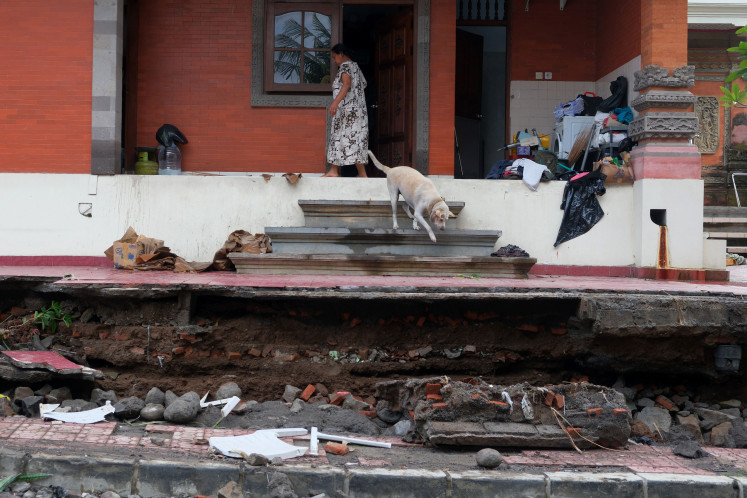Popular Reads
Top Results
Can't find what you're looking for?
View all search resultsPopular Reads
Top Results
Can't find what you're looking for?
View all search resultsJokowi backtracks from Ba’asyir release plan
The tragic image of the 2002 Bali bombings still remain fresh in the memory of Tumini, one of many victims who survived the blasts that killed more than 200 people on the country’s most popular tourist island
Change text size
Gift Premium Articles
to Anyone
T
he tragic image of the 2002 Bali bombings still remain fresh in the memory of Tumini, one of many victims who survived the blasts that killed more than 200 people on the country’s most popular tourist island.
She was working as a bartender at Paddy’s Bar in Kuta when the bombs ripped through the area, burning some parts of her body in an instant. She was mistaken as dead and taken to a hospital, where her sister later found her lying among dozens of dead bodies.
Tumini would never forget the deadly incident and she was taken aback when President Joko “Jokowi” Widodo announced on Friday a plan to unconditionally release Abu Bakar Ba’asyir, a radical Muslim cleric who had been convicted of masterminding the Bali bombings, on the grounds of his advanced age and declining health.
According to Jokowi’s lawyer, Yusril Ihza Mahendra, the President agreed to exempt the cleric, who had a long history of defying the country’s ideology of Pancasila, from a requirement to declare his loyalty to the country and Pancasila to win his release.
“It is not fair. As a victim, I object to the plan,” Tumini told The Jakarta Post. “Should he get early release only for humanitarian reasons while he had killed so many people?”
After facing a deluge of criticisms from the survivors of the bombings and the families of victims, Jokowi said on Tuesday that the 80-year-old cleric was still required to sign documents expressing his loyalty to the country.
“As I said before, the humanitarian considerations are that cleric Ba’asyir is very old and has many health problems,” Jokowi said. “But we have a legal system and we have to go through the legal mechanism for conditional parole. The conditions for that must be fulfilled. I cannot clash with that. For example, loyalty to the [country], loyalty to Pancasila: Those are basic principles.”
Defense Minister Ryamizard Ryacudu echoed Jokowi’s statement.
“Yes, of course [he has to accept Pancasila],” Ryamizard said at the Defense Ministry building on Tuesday, as quoted by Antara. “If not, that means he is just a squatter [in this country]. If he squats for too long he may be driven off.”
Ba’asyir, who has been in prison since 2011 after receiving a 15-year sentence for funding a military training camp for terrorists in Aceh, has resisted declaring loyalty to Pancasila, which Government Regulation No. 99/2012 stipulates as a condition for obtaining parole.
The radical cleric, who is currently detained in Gunung Sindur Prison in Bogor, West Java, has received treatment for chronic venous insufficiency, blood clots and varicose veins in his legs since 2017.
Australian Prime Minister Scott Morrison has requested Indonesia show “great respect” to Australia, many citizens of which died during the 2002 Bali bombings.
Isaac Kfir, the head of the Counter-Terrorism Policy Center at the Australian Strategic Policy Institute, said Australia saw Indonesia as central to its counterterrorism policy. “Since 9/11 and certainly after Bali, they have invested heavily in helping Indonesia develop an effective counterterrorism policy,” he told Post through an email on Tuesday.
“Australia has also included supporting the Jakarta Center for Law Enforcement Cooperation, working with Indonesian authority on improving the country’s counterterrorism laws.”
Kfir said he was uncertain if Ba’asyir still presented the same risk, but said Indonesia must do more to address radicalization in prison.
“Ba’asyir is 80 years old, has been in and out of prison for decades, and therefore I just don’t know how much pull he has with the younger generation of jihadis,” he said.
The Bali bombings, which ravaged Kuta on Oct. 12, 2002, killed 202: 88 Australians, 38 Indonesians and 76 more from at least 20 other nations.
— ACICIS intern Connor Foley contributed to this article










